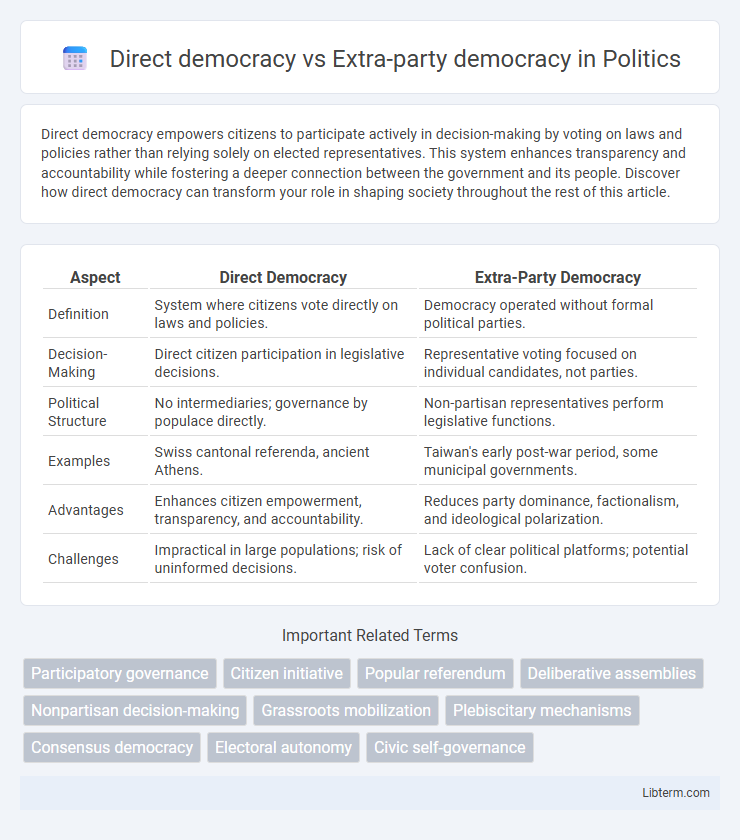Direct democracy empowers citizens to participate actively in decision-making by voting on laws and policies rather than relying solely on elected representatives. This system enhances transparency and accountability while fostering a deeper connection between the government and its people. Discover how direct democracy can transform your role in shaping society throughout the rest of this article.
Table of Comparison
| Aspect | Direct Democracy | Extra-Party Democracy |
|---|---|---|
| Definition | System where citizens vote directly on laws and policies. | Democracy operated without formal political parties. |
| Decision-Making | Direct citizen participation in legislative decisions. | Representative voting focused on individual candidates, not parties. |
| Political Structure | No intermediaries; governance by populace directly. | Non-partisan representatives perform legislative functions. |
| Examples | Swiss cantonal referenda, ancient Athens. | Taiwan's early post-war period, some municipal governments. |
| Advantages | Enhances citizen empowerment, transparency, and accountability. | Reduces party dominance, factionalism, and ideological polarization. |
| Challenges | Impractical in large populations; risk of uninformed decisions. | Lack of clear political platforms; potential voter confusion. |
Understanding Direct Democracy: Core Principles
Direct democracy centers on citizens exercising decision-making power directly through referenda and initiatives, bypassing representative intermediaries. Core principles include political equality, active participation, and majority rule, ensuring that laws and policies reflect the immediate will of the electorate. This contrasts with extra-party democracy, where informal groups or movements influence governance outside formal party structures.
Defining Extra-party Democracy: A Conceptual Overview
Extra-party democracy refers to a political system where democratic practices occur outside the traditional framework of formal political parties, emphasizing direct citizen participation and grassroots decision-making. This model challenges conventional party dominance by promoting alternative mechanisms such as referenda, citizen assemblies, and community-led initiatives to influence governance. By minimizing the role of political parties, extra-party democracy seeks to enhance inclusivity and responsiveness in political processes.
Historical Evolution of Direct Democracy
Direct democracy traces its roots to ancient Athens, where citizens actively participated in decision-making through assemblies and referendums, embodying pure democratic engagement. Throughout history, direct democratic principles influenced the development of modern democratic systems, particularly in Swiss cantons and New England town meetings, emphasizing local citizen involvement. Extra-party democracy, emerging in the 20th century, contrasts this by promoting governance beyond traditional party structures, often focusing on issue-based participation rather than historical citizen assemblies.
Origins and Development of Extra-party Democracy
Extra-party democracy originated as a response to the limitations of traditional party-based systems, emphasizing citizen participation outside formal political parties to enhance transparency and accountability. It developed prominently during the late 20th century in various regions, where political parties were viewed as corrupt or ineffective, leading to increased use of referendums, initiatives, and other direct citizen engagement mechanisms. This model fosters greater inclusivity and adapts quickly to social changes by reducing party dominance and promoting individual voter influence in political decision-making.
Mechanisms of Decision-making: Referendums vs Independent Platforms
Direct democracy relies heavily on referendums as mechanisms of decision-making, enabling citizens to vote directly on policies and laws, which enhances public participation and accountability. Extra-party democracy centers on independent platforms or civil society organizations that influence policy decisions outside traditional party systems, promoting diverse representation and expert input in governance. Referendums emphasize collective choice by the electorate, while independent platforms focus on decentralized, issue-specific advocacy and deliberation.
Citizen Participation: Involvement and Empowerment
Direct democracy maximizes citizen participation by enabling individuals to vote directly on laws and policies, fostering a sense of empowerment through active decision-making. Extra-party democracy promotes involvement by encouraging citizens to engage beyond traditional party lines, emphasizing grassroots movements and issue-based activism. Both models enhance empowerment but differ in mechanisms: direct democracy relies on formal voting, while extra-party democracy utilizes diverse, participatory channels to amplify citizen voices.
Advantages and Limitations of Direct Democracy
Direct democracy enables citizens to vote directly on laws and policies, enhancing political participation and increasing government accountability by reflecting the electorate's immediate will. Its main limitation lies in the complexity of issues that may overwhelm voters, often resulting in low informed decision-making and potential majority tyranny. Direct democracy is less efficient for large, diverse populations compared to extra-party democracy, which relies on elected representatives to balance competing interests and facilitate governance.
Pros and Cons of Extra-party Democracy
Extra-party democracy promotes political pluralism and reduces the risk of authoritarianism by allowing multiple parties to compete and represent diverse interests in governance. However, this system may lead to fragmentation, resulting in coalition instability and slower decision-making processes. The presence of multiple parties can enhance voter choice but also increase political polarization and governance complexity.
Case Studies: Global Examples of Each Model
Switzerland exemplifies direct democracy through frequent referendums and popular initiatives enabling citizen-driven policy decisions, ensuring high public participation and governmental transparency. In contrast, Singapore represents extra-party democracy, where power remains consolidated within a dominant party, limiting opposition roles but maintaining political stability and rapid policy implementation. Comparative studies reveal direct democracy enhances civic engagement but may slow decision-making, while extra-party democracy streamlines governance yet risks suppressing pluralism.
Future Prospects: Direct vs Extra-party Democracy in Modern Governance
Direct democracy offers enhanced citizen participation through referenda and initiatives, enabling real-time public decision-making that can increase governmental transparency and accountability. Extra-party democracy, characterized by governance beyond traditional party structures, promotes diverse political engagement by incorporating multiple interest groups and civic organizations, fostering inclusivity in policymaking processes. Future governance models may blend direct democratic mechanisms with extra-party frameworks to balance efficient decision-making and pluralistic representation in increasingly complex political landscapes.
Direct democracy Infographic

 libterm.com
libterm.com